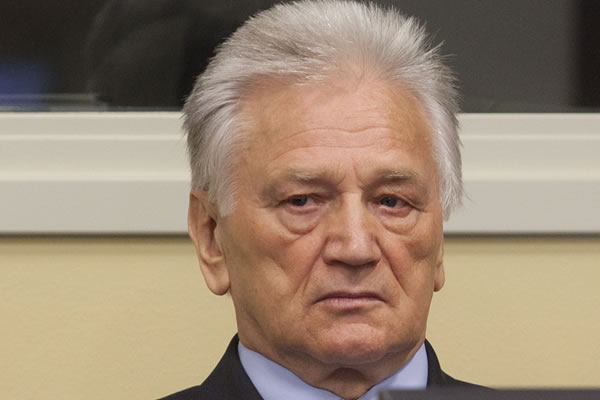Home
NO RECONSIDERATION OF PERISIC JUDGMENT
The prosecution’s motion to the Appeals Chamber for the reconsideration of the judgment against former chief of the Yugoslav Army General Staff Momcilo Perisic has been denied. Perisic was acquitted of aiding and abetting the crimes in Sarajevo and Srebrenica. ‘The interest of the victims’ is not a legal ground for reconsideration, the judges note in their decision
 Momcilo Perisic in the courtroom
Momcilo Perisic in the courtroom Judge Theodor Meron’s Appeals Chamber denied the prosecution’s motion for the reconsideration of Momcilo Perisic’s judgment. The former chief of the Yugoslav Army General Staff was acquitted of aiding and abetting the crimes in Sarajevo and Srebrenica. The Trial Chamber sentenced Perisic to 27 years in prison but its judgment was quashed on appeal.
In February 2014, the prosecution called for the reconsideration, invoking the recent appellate judgment in the Kosovo Four case. The judges found that the judges in Perisic’s case erred when they sought the evidence of the ‘specific direction’ to the commission of the crimes as an element of the liability for aiding and abetting. In the Kosovo case, the Appeals Chamber concluded that the findings in Perisic’s judgment were based on ‘an obviously erroneous standard that runs counter to the prevailing jurisprudence’.
The Appeals Chamber quoted from the prosecution’s motion in its decision. The prosecution argued that the reconsideration was needed to prevent ‘miscarriage of justice’, which is reason enough for the Appeals Chamber to depart from its previous opinion that it ‘has no power to reconsider final judgments’. The need to prevent miscarriage of justice, in the prosecution’s view, overrides Perisic’s ‘right to the finality of the process’.
In response to the prosecution’s motion, the defense stressed that the appellate judgments are final and are not subject to reconsideration. The defense argued that the Perisic judgment didn’t result in miscarriage of justice and that the Appeals Chamber should respect Perisic’s right to the finality of the process.
The decision, signed by Judge Meron, restates that the Appeals Chamber lacks the power to reconsider its own decisions. The Tribunal’s Statute does not provide for the right to a second-instance appeal in form of the reconsideration. In their decision, the judges stress the ‘importance of certainty and finality of the judgments’, both for the victims and for the accused that have been convicted or acquitted. The ‘interest of the victims’ invoked by the prosecution ‘does not constitute legal grounds for the motion to be granted’. Judge Meron’s Appeals Chamber concluded that the prosecution had failed to provide valid reasons that would impel the judges to depart from the jurisprudence in the interests of justice. Thus, it seems, the Perisic case is finally over.
